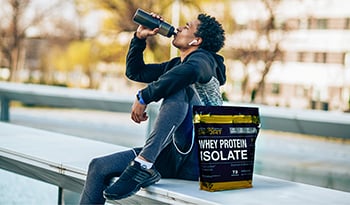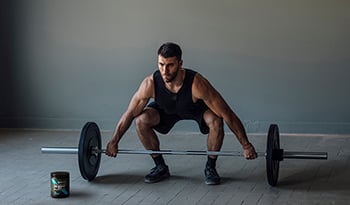Pre-Workout Supplements: Benefits, Best Ingredients, + Tips from a Trainer

People of all training levels have increasingly been using supplements to improve their athletic performance.1 And with their popularity on social media, the use of pre-workout supplements has become widespread.
Pre-workout supplements typically contain multiple ingredients and are designed to be taken before exercise to help increase athletic performance. Common ingredients in pre-workout supplements include caffeine, branched-chain amino acids, nitrates, creatine, and beta-alanine.1
But not all pre-workout supplements are created equal. While high-quality pre-workout supplements contain the proper dosages of ingredients, others have too much or too little of their active ingredients to truly affect performance.
You need to know what to look for to choose an effective pre-workout supplement. In this article, I’ll explain the benefits of pre-workout supplements and how to find a quality, effective supplement for your needs.
Popular Pre-workout Supplements
Many products claim their pre-workout supplement is the best for improving athletic performance—but don’t be fooled by marketing. The ingredients below are those you’re most likely to find in pre-workout supplements.
1. Caffeine
Caffeine is the main ingredient responsible for the performance-enhancing effects in most pre-workout supplements.1 Abundant research supports caffeine’s effectiveness in improving athletic performance. Studies suggest consuming between three to six milligrams of caffeine per kilogram of body weight can improve muscular endurance, strength, sprinting, jumping, throwing performance, and various aerobic activities.2 For a person weighing 150 pounds, this equals about 200 to 400 milligrams of caffeine. Be sure to take this dosage into account when choosing a pre-workout supplement.
2. Amino Acids
Amino acids, the building blocks of proteins, are commonly included in pre-workout supplements. Studies suggest the amino acid taurine may increase time-to-exhaustion during endurance exercise. The recommended dosage for improved muscular endurance during resistance training is 1.5 grams of taurine.3
Branched-chain amino acids (BCAAs) are also commonly added to pre-workout supplements. However, evidence suggests that they may not significantly enhance exercise performance or stimulate muscle protein synthesis as many companies may claim.4,5
L-arginine is another common amino acid added to pre-workout supplements. As a precursor for nitric oxide, L-arginine is thought to improve athletic performance through increased blood flow during exercise. However, more research is needed to determine whether it has this effect.6,7
Studies suggest the amino acid L-citrulline increases vasodilation and improves exercise performance.6,8 However, you’d have to consume 6 to 8 grams of L-citrulline daily to have this effect, which is far higher than what most pre-workout supplements contain.1,6,8
Beta-alanine is another amino acid added to many pre-workout supplements. Studies suggest consuming between 4 to 6 grams of beta-alanine daily can improve high-intensity exercise performance.10 Like all pre-workout ingredients, dosage matters. Choose a supplement that contains the recommended dosage of beta-alanine.
3. Creatine
Creatine is another widely-researched ingredient commonly found in pre-workout supplements.1 According to the International Society of Sports Nutrition, “creatine monohydrate is the most effective ergogenic nutritional supplement currently available to athletes with the intent of increasing high-intensity exercise capacity and lean body mass during training.”9 The recommended dosage for creatine supplementation is 3 to 5 grams daily, so choose a pre-workout supplement that contains this amount.9
What To Look for In A Pre-workout Supplement
When choosing between supplements, finding one with third-party certification is important. Many pre-workout supplements list their ingredients as a “proprietary blend” without listing specific amounts of certain ingredients.1,11 Labeling practices like this make it challenging to know whether a supplement contains the proper dosage of key ergogenic ingredients.1 Third-party certification ensures that an independent organization looked over the supplement’s manufacturing process and determined that the product meets specific standards for quality and safety.11
In addition to looking for a third-party certified supplement, choose one that contains the proper dosages of active ingredients. Many companies claim their pre-workout supplement is the most effective because it contains certain ingredients—but these ingredients must be in the right dosages to be effective.1 Always check the dietary supplement label to ensure the dosages are adequate. Without proper doses, these supplements may be ineffective and not live up to their claims.
Benefits Of Pre-workout Supplements
Pre-workout supplements can provide many performance-enhancing benefits. A large body of research shows that multi-ingredient pre-workout supplements (MIPS) can positively influence force production when used long-term (greater than 10 days). Two studies examining the effects of MIPS on untrained males found that their one-repetition max (1-RM) on bench press increased when taking a pre-workout supplementation with caffeine, whey, BCAAs, creatine, β-alanine, and L-arginine.12,13
Research also suggests that pre-workout supplements can improve body composition. Multiple studies in resistance-trained males suggest using pre-workout supplements long-term leads to a significant increase in fat-free mass (FFM) while resistance training compared to a placebo. However, participants in these studies also consumed protein post-workout, which can also improve body composition.14,15
Caffeine may improve cognitive and physical performance in both trained and untrained individuals when used correctly.2 The most commonly used timing of caffeine supplementation is 60 minutes before exercise, so be sure to time your pre-workout supplementation correctly.2
The Benefits Of Stimulant-Free Pre-workout Supplements
Caffeine is a stimulant commonly added to pre-workout supplements. While it improves performance in both anaerobic and aerobic exercises, caffeine has side effects that can last several hours.2 In fact, the amount of time it takes for the body to eliminate just half of the total caffeine from the body varies from person to person, ranging anywhere from two to 12 hours.16
Because caffeine can linger in a person’s system for many hours, consuming caffeine too close to bedtime can significantly interfere with sleep. The current recommendation is to stop caffeine intake about eight hours before bedtime, which can be difficult for evening gym-goers who want to take advantage of pre-workout supplements.16 This is where a stimulant-free pre-workout supplement becomes helpful.
A stimulant-free pre-workout supplement does not contain caffeine, so it is safe to consume at any time of the day without affecting sleep. Stimulant-free pre-workout supplements are ideal for individuals who enjoy exercising in the evenings or those who are overly sensitive to caffeine.
Many people also enjoy drinking additional caffeinated beverages, like coffee or tea. When coffee, tea, or other caffeinated beverage consumption is combined with caffeine-containing pre-workout supplements, adverse side effects like gastrointestinal distress, nervousness, and difficulty falling asleep can occur.17
The Food and Drug Administration (FDA) has deemed up to 400 milligrams of caffeine safe for the general population.18 If you frequently consume caffeinated beverages, a stimulant-free pre-workout supplement may be a better option to avoid caffeine’s adverse side effects.
Who Should Take A Pre-workout Supplement?
Abundant research suggests that pre-workout supplements are safe and free of adverse effects for most adults. Studies looking specifically at the impact of long-term pre-workout supplement use on heart rate and blood pressure showed no adverse effects.1
A pre-workout supplement may be a great option if you have hit a plateau or want to improve your athletic performance. Look for a supplement containing the proper amount of caffeine for your needs while ensuring other key ingredients, like creatine or taurine, are in the correct dosages. Further, ensuring your supplement is third-party tested minimizes any safety risks.
References:
- Harty PS, Zabriskie HA, Erickson JL, Molling PE, Kerksick CM, Jagim AR. Multi-ingredient pre-workout supplements, safety implications, and performance outcomes: a brief review. J Int Soc Sports Nutr. 2018 Aug 8;15(1):41. doi: 10.1186/s12970-018-0247-6. PMID: 30089501; PMCID: PMC6083567.
- Guest NS, VanDusseldorp TA, Nelson MT, Grgic J, Schoenfeld BJ, Jenkins NDM, Arent SM, Antonio J, Stout JR, Trexler ET, Smith-Ryan AE, Goldstein ER, Kalman DS, Campbell BI. International society of sports nutrition position stand: caffeine and exercise performance. J Int Soc Sports Nutr. 2021 Jan 2;18(1):1. doi: 10.1186/s12970-020-00383-4. PMID: 33388079; PMCID: PMC7777221.
- Hoffman JR, Ratamess NA, Ross R, Shanklin M, Kang J, Faigenbaum AD. Effect of a pre-exercise energy supplement on the acute hormonal response to resistance exercise. J Strength Cond Res. 2008;22(3):874–882. doi: 10.1519/JSC.0b013e31816d5db6.
- Wolfe RR. Branched-chain amino acids and muscle protein synthesis in humans: myth or reality? J Int Soc Sports Nutr. 2017;14:30. doi: 10.1186/s12970-017-0184-9.
- Campbell B, Kreider RB, Ziegenfuss T, La Bounty P, Roberts M, Burke D, Landis J, Lopez H, Antonio J. International Society of Sports Nutrition position stand: protein and exercise. J Int Soc Sports Nutr. 2007;4(1):8. doi: 10.1186/1550-2783-4-8
- Bescos R, Sureda A, Tur JA, Pons A. The effect of nitric-oxide-related supplements on human performance. Sports Med. 2012;42(2):99–117. doi: 10.2165/11596860-000000000-00000.
- Alvares TS, Meirelles CM, Bhambhani YN, Paschoalin VM, Gomes PS. L-arginine as a potential ergogenic aid in healthy subjects. Sports Med. 2011;41(3):233–248. doi: 10.2165/11538590-000000000-00000.
- Figueroa A, Wong A, Jaime SJ, Gonzales JU. Influence of L-citrulline and watermelon supplementation on vascular function and exercise performance. Curr Opin Clin Nutr Metab Care. 2017;20(1):92–98. doi: 10.1097/MCO.0000000000000340.
- Kreider RB, Kalman DS, Antonio J, Ziegenfuss TN, Wildman R, Collins R, Candow DG, Kleiner SM, Almada AL, Lopez HL. International Society of Sports Nutrition position stand: safety and efficacy of creatine supplementation in exercise, sport, and medicine. J Int Soc Sports Nutr. 2017 Jun 13;14:18. doi: 10.1186/s12970-017-0173-z. PMID: 28615996; PMCID: PMC5469049.
- Trexler ET, Smith-Ryan AE, Stout JR, Hoffman JR, Wilborn CD, Sale C, Kreider RB, Jäger R, Earnest CP, Bannock L, et al. International society of sports nutrition position stand: Beta-alanine. J Int Soc Sports Nutr. 2015;12(1):30. doi: 10.1186/s12970-015-0090-y.
- What is Third-Party Certification? https://www.nsf.org/knowledge-library/what-is-third-party-certification
- Shelmadine B, Cooke M, Buford T, Hudson G, Redd L, Leutholtz B, Willoughby DS. Effects of 28 days of resistance exercise and consuming a commercially available pre-workout supplement, NO-shotgun(R), on body composition, muscle strength and mass, markers of satellite cell activation, and clinical safety markers in males. J Int Soc Sports Nutr. 2009;6:16. doi: 10.1186/1550-2783-6-16.
- Spillane M, Schwarz N, Leddy S, Correa T, Minter M, Longoria V, Willoughby DS. Effects of 28 days of resistance exercise while consuming commercially available pre- and post-workout supplements, NO-Shotgun(R) and NO-Synthesize(R) on body composition, muscle strength and mass, markers of protein synthesis, and clinical safety markers. Nutr Metab (Lond) 2011;8:78. doi: 10.1186/1743-7075-8-78.
- Ormsbee MJ, Mandler WK, Thomas DD, Ward EG, Kinsey AW, Simonavice E, Panton LB, Kim JS. The effects of six weeks of supplementation with multi-ingredient performance supplements and resistance training on anabolic hormones, body composition, strength, and power in resistance-trained men. J Int Soc Sports Nutr. 2012;9(1):49. doi: 10.1186/1550-2783-9-49.
- Ormsbee MJ, Thomas DD, Mandler WK, Ward EG, Kinsey AW, Panton LB, Scheett TP, Hooshmand S, Simonavice E, Kim JS. The effects of pre- and post-exercise consumption of multi-ingredient performance supplements on cardiovascular health and body fat in trained men after six weeks of resistance training: a stratified, randomized, double-blind study. Nutr Metab (Lond) 2013;10(1):39. doi: 10.1186/1743-7075-10-39.
- How Long Does it Take for Caffeine to Wear Off? https://www.sleepfoundation.org/nutrition/how-long-does-it-take-caffeine-to-wear-off
- Caffeine. https://uhs.princeton.edu/health-resources/caffeine
- Spilling the Beans: How Much Caffeine is Too Much? https://www.fda.gov/consumers/consumer-updates/spilling-beans-how-much-caffeine-too-much
DISCLAIMER:This Wellness Hub does not intend to provide diagnosis...
















































































 Table of Contents
Table of Contents









